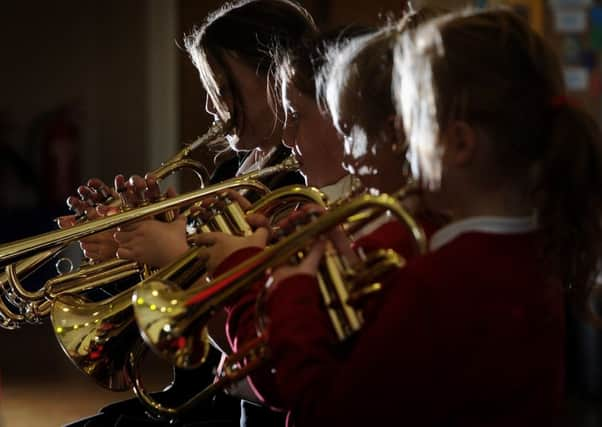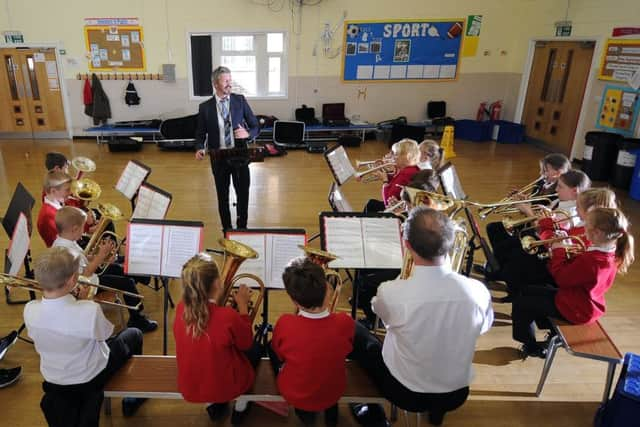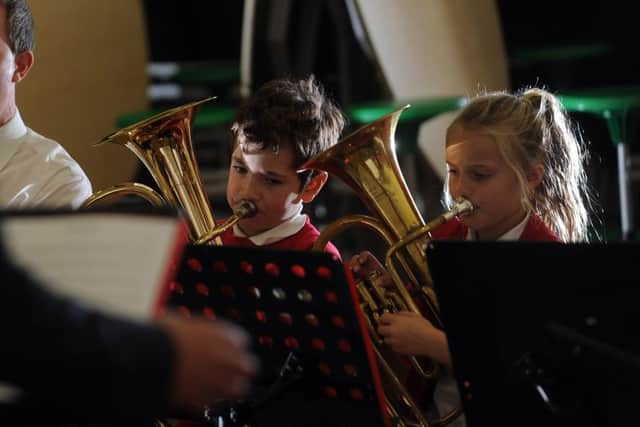Cutbacks strike wrong note for budding Yorkshire musicians


But Queensbury’s brass roots are at a precipice. Money for a musical education has run out and the village school, its ethos built on the arts, has turned to singing and sponsorship to bring in the cash.
Christmas is a money-spinner, says head teacher Sally Hey. The primary’s two choirs and hearty brass band can fill buckets with donations if they perform outside the local supermarket.
Advertisement
Hide AdAdvertisement
Hide AdIt is essential, she says. Because their musical education in school is bringing them life skills, honing talent, building confidence, and most of all, making them happy. And happy children, she adds, achieve.


“We are punching above our weight,” said Mrs Hey, citing a long list of impressive academic results. “I’m seeing children who are starting to enjoy school, I’m seeing improved behaviour, improved attainment.
“I think happy children achieve well, in the same way that happy staff do. We still run a tight ship, mind, and they scarper when they hear my heels in the corridors.
“But in the arts, the wrong decisions are being made. In 20 year’s time, are we not going to have music? Because the children won’t have the skills.
Advertisement
Hide AdAdvertisement
Hide Ad“The arts are going. There isn’t any specific funding whatsoever. I don’t want to let this go.”


More than half the children at Foxhill Primary School are in the choir, with 25 children in the brass band. In all, 74 children are learning instruments in addition to the recorder.
“I’ve got 238 children,” reflects Mrs Hey. “If I look up on my wall, I’ve got all the figures. They do all these things, in curriculum time. And they are still doing better, academically. Schools can find a way, if they want to.
“Everybody has different skills in life. What about the gifted musical students? I had one little boy, he could sing before he could talk.
Advertisement
Hide AdAdvertisement
Hide Ad“We need a world full of people with these skills. But if nobody plays an instrument any more, and nobody gives the children a chance to learn, what will happen?
“We lose, these schools. These little people, that they are now, are going to grow up into adults who can’t give as much to society.
“It’s a great shame, but the arts are worth fighting for. Children absolutely thrive on it.”
A few years ago, when the school had first shifted its focus to music, there was money in the system to fund it. Small pots of cash, which could be juggled about to make it work.
Advertisement
Hide AdAdvertisement
Hide Ad“It came to a point where there was no funding left,” said Mrs Hey. “We’re looking at a possible three years, stand-still budget. I’m not able to move the money about any more.
“We’re down to fundraising locally, to continue the arts. Christmas is a big time, I wheel my choir and brass bands down to the local Tesco and raise what we can carry in our buckets.
“We may only come back with £50 or £60 but it can change what we do. I’ve got people who have given us a little bit, one lady gave us £10, because it was what she could afford. We have somebody that gives us £1,000 every year, in memory of their sister who was a musician. What we really need is a sponsor.”
The cash pays for teachers who can run music lessons and, when there’s any left over, for a minibus to take the children to perform at a home for the terminally ill down the road.
Advertisement
Hide AdAdvertisement
Hide AdAll the children can read music, something Mrs Hey sees as a life skill which will stay with them. They grow older, and move on, and the training begins again with each new cohort.
“The Government has to look at the wider impact,” says Mrs Hey. “If they were to put ring-fenced funding into the arts, it would be used. That isn’t happening, so headteachers have had to make difficult decisions.
“It’s not easy,” she adds. “Who is running the school while I am doing all this?
“My job isn’t music – it’s to run a school. But a very important part of that is how we educate, what our ethos is.
Advertisement
Hide AdAdvertisement
Hide Ad“Ours is for the arts. For as long as I’m head, I’m not going to take any enjoyment out of school for the children.”
The news comes as proposed changes to how schools are inspected including focusing more on the wider curriculum and less on exam results are not about “going soft” but rewarding real education, the head of Ofsted said.
Chief Inspector of Schools Amanda Spielman announced plans to change the way the education watchdog inspects schools, colleges and further education institutions from September 2019, to discourage so-called exam factories.
That will mean inspectors move away from looking at headline data and instead judge how those results are achieved and whether schools are offering a broad curriculum or merely teaching to the test. After delivering a speech outlining the plans to headteachers at a conference in Newcastle, Ms Spielman insisted Ofsted continued to desire to reward rigour in education.